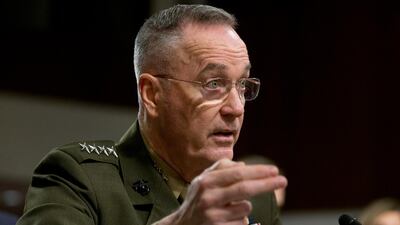The US refuted a report late on Sunday that claimed it intended to leave arount 1,000 troops in Syria, calling it “factually incorrect", while confirming plans for several hundred troops to remain in the war-torn country.
“There have been no changes to the plan announced in February and we continue to implement the president’s direction to draw down US forces to a residual presence,” General Joseph Dunford, chairman of the Joint Chiefs of Staff, said in a statement.
The announcement follows a report by The Wall Street Journal on Sunday, in which the newspaper cited US officials saying there were plans to continue working with Kurdish fighters in Syria who face threats from Turkey and maintain a military presence.
The report highlighted that the 1,000 troops would be stationed across Syria. The plan was a direct result of failed talks, between the US, Turkey, European allies and the Kurds, aimed at establishing a safe zone in Syria.
General Dunford confirmed that Washington will continue to conduct “detailed military planning with the Turkish General Staff to address Turkish security concerns along the Turkey-Syria border".
“We are also conducting planning with other members of the Coalition who have indicated an intent to support the transition phase of operations into Syria,” he said.
US President Donald Trump announced a complete military withdrawal in December, ending Washington’s involvement in Syria.
In February, the president declared that “we just took over 100 per cent” of territory controlled by ISIS in Syria.
"You kept hearing it was 90 per cent, 92 per cent, the caliphate in Syria. Now it’s 100 per cent, we just took over,” Mr Trump said during remarks to troops last month.
Yet his announcement triggered pleas from both Republican and Democrats in Washington who fear a troop pullout would lead to an ISIS resurgence.
The decision also led to the resignation of Defense Secretary James Mattis.
General Joseph Votel, the top military commander in charge of the fight against ISIS, said last month the fight against the insurgents is far from over.
"The group still has leaders, still has fighters, still has facilitators and still has resources," he said.
The director of National Intelligence, Dan Coats, told congress in January that ISIS still posed a threat and maintained a presence in Syria.
With pressure mounting from various politicians, the president earlier this month told a bipartisan group that he agreed to keep a US military presence in Syria.
The White House then announced it was planning to keep nearly 400 troops who would be reinforced by allies in the anti-ISIS coalition.
US military commanders have been made aware that while Mr Trump has allowed for several hundred troops to stay in Syria, he will eventually pull them out.


